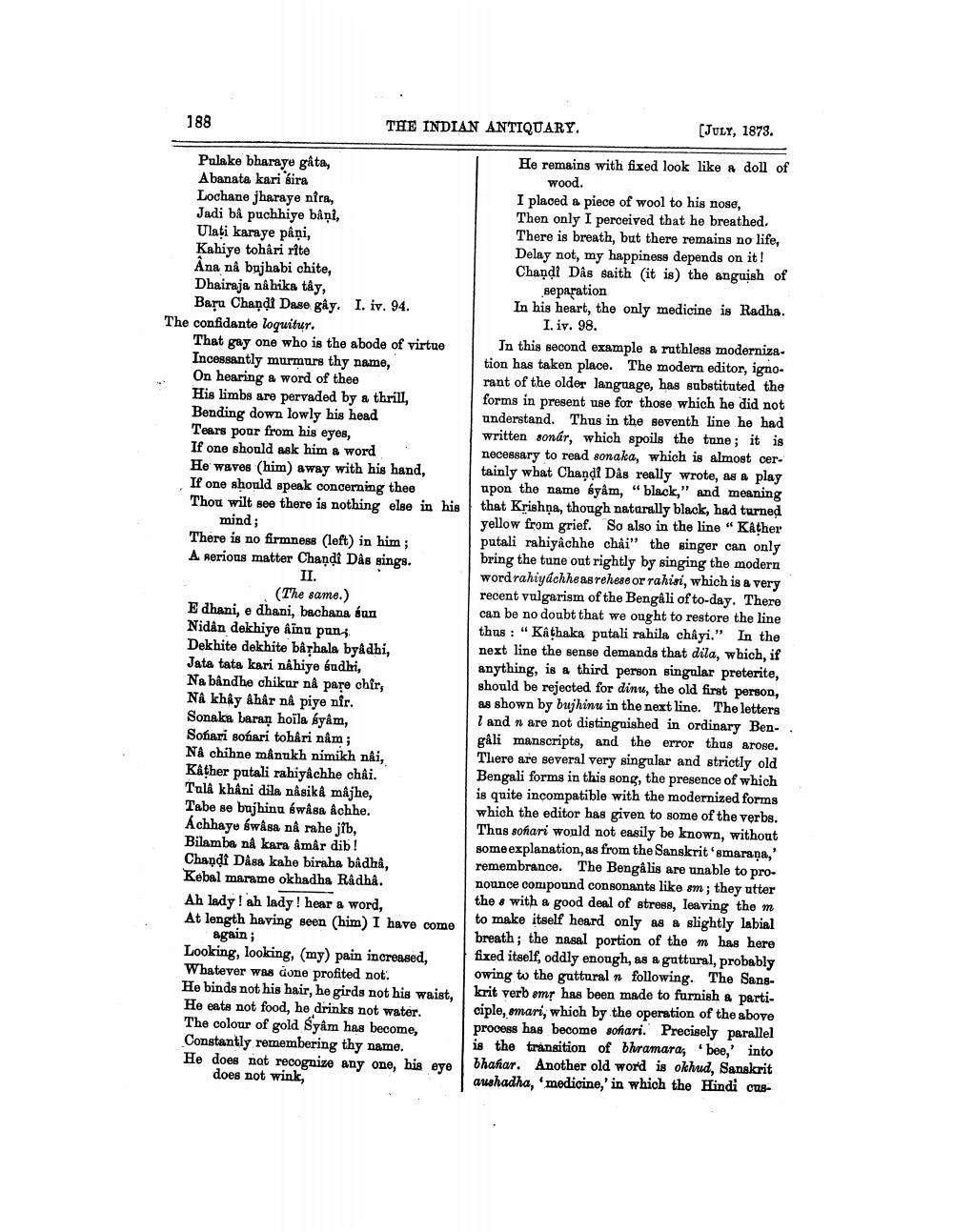________________
188
THE INDIAN ANTIQUARY.
(JULY, 1873.
Palake bharaye gâta, Abanata karibira Lochane jharaye nira, Jadi bâ puchhiye bâņi, Ulați karaye påņi, Kahiye tohari rite Ana na bujhabi chite, Dhairaja nahika tây,
Baru Chandi Dase gây. I. iv. 94. The confidante loquitur.
That gay one who is the abode of virtue Incessantly murmurs thy name, On hearing a word of thee His limbs are pervaded by a thrill, Bending down lowly his head Tears pour from his eyes, If one should ask him & word He waves (him) away with his hand, If one should speak concerning thee Thou wilt see there is nothing else in his
mind; There is no firmness (left) in him ; A serious matter Chandi Dås sings.
(The same.) E dhani, e dhani, bachana sun Nidån dekhiye åinu pun; Dekhite dekhite bâphala byâdhi, Jata tata kari nahiye budhi, Na bândhe chikur nå pare chir, Nó khay Chân na piye nfr. Sonaka baran hoīla syâm, Sonari sohari tohári nam; Nå chihne mânukh nimikh nâi, Kather putali rahiyâchhe châi. Tuli khâni dila nâsikâ majhe, Tabe se bujhinu śwÅsa achhe. Achhaye bwasa na rahe jib, Bilamba na kara âmår dib! Chandi Dâsa kahe biraha bâdha, Kebal marame okhadha Radha. Ah lady! ah lady! hear a word, At length having seen (him) I have como
again; Looking, looking, (my) pain increased, Whatever was done profited not. He binds not his hair, he girds not his waist, He ents not food, he drinks not water. The colour of gold Syam has become, Constantly remembering thy name. He does not recognize any one, his eye
does not wink,
He remains with fixed look like a doll of
wood. I placed a piece of wool to his nose, Then only I perceived that he breathed. There is breath, but there remains no life, Delay not, my happiness depends on it! Chandi Das saith it is) the anguish of
separation In his heart, the only medicine is Radha.
I. iv. 98. In this second example a ruthless modernization has taken place. The modern editor, ignorant of the older language, has substituted the forms in present use for those which he did not understand. Thus in the seventh line he had written sonar, which spoils the tone; it is necessary to read sonaka, which is almost certainly what Chandi Das really wrote, as a play upon the name syåm, "black," and meaning that Krishņa, though naturally black, had turned yellow from grief. So also in the line " Kather putali rahiyâchhe chai" the singer can only bring the tune out rightly by singing the modern word rahiyachhe as rehese or rahisi, which is a very recent vulgarism of the Bengali of to-day. There can be no doubt that we ought to restore the line thus : "Kathaka patali rahila cháyi." In the next line the sense demands that dila, which, if anything, is a third person singular preterite, should be rejected for dinu, the old first person, as shown by bujhinu in the next line. The letters 1 and n are not distinguished in ordinary Bengali manscripts, and the error thus arose. There are several very singular and strictly old Bengali forms in this song, the presence of which is quite incompatible with the modernized forms which the editor has given to some of the verbs. Thus soñari would not easily be known, without some explanation, as from the Sanskrit 'smarana, remembrance. The Bengalis are unable to pronounce compound consonants like sm; they utter the . with a good deal of stress, leaving the m to make itself heard only as a slightly labial breath; the nasal portion of them has here fixed itself, oddly enough, as a guttural, probably owing to the guttural n following. The Sanskrit verb sms has been made to furnish a participle, omari, which by the operation of the above process has become sofari. Precisely parallel is the transition of bhramara, bee,' into bhanar. Another old word is okhud, Sanskrit bhanar. Another aushadha, medicine,' in which the Hindi cus




